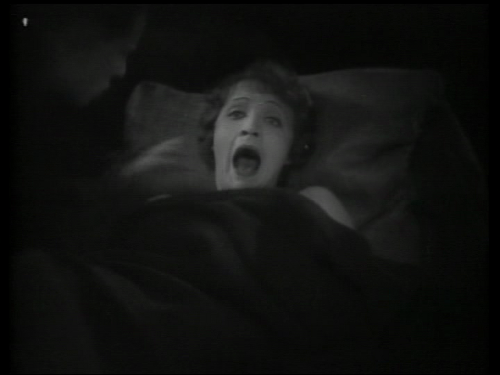 |
| Scream if you like silents! |
Earlier in June, I ordered the last silent movie that Marlene Dietrich filmed, The Ship of Lost Men (a.k.a. Das Schiff der verlorenen Menschen, a.k.a. The Ship of Lost Souls, a.k.a. the worst alternate title ever, Grischa the Cook), on DVD from Grapevine Video. After my difficulties with TCM Shop, I hesitated to do business again with a small outlet, but my concerns were unfounded. Grapevine’s checkout process was simple, and within two days after placing my order, I had the product in my hands. Therefore, I give my unsolicited endorsement of Grapevine and look forward to ordering DVDs from its site in the future.
For most of my entries, I research what I present to you. Well, I’m a bit burnt out from that and will leave it to someone else to answer my questions. Was Grapevine responsible for the restoration and music of its
The Ship of Lost Men release? If so, I’d like to thank them. The score,
performed by David Knudtson, accentuates every scene appropriately due to the theater organ’s portentous timbre. The subtitles are mostly free of typos and certainly weren’t translated by Babelfish. The length--at 122 minutes--exceeds the 1996
Critic’s Choice Video VHS release, which is 97 minutes. Not having seen any other versions of this movie, I’d like for those of you who have watched this Grapevine release and previous releases to compare them.
Although I hate writing synopses, I’ll distill what I watched below. Of course, be forewarned that I may have seen a different cut than what others have detailed on
IMDB and
elsewhere. Spoiler-haters, you ought to skip this altogether:
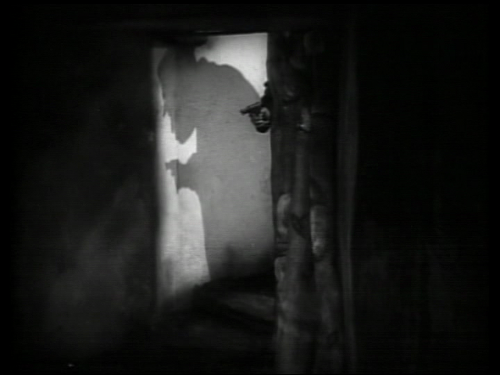 |
| Is that any way to greet a stranger, Captain Vela? |
Prison breaker Morain (Gaston Modot) tramples through reeds to hop a train, arriving at a port town where he encounters a boozing monkey and its master, Captain Fernando Vela (Fritz Kortner). With a scowl, Morain asks to board Vela’s Brazil-bound, "stupid rotten boat" Galathee. Customer service skills lacking, Vela rejects Morain’s money as acceptable fare and informs him that he’ll have to work the deck. Once he meets his disheveled shipmates, Morain sets to inciting their ire.
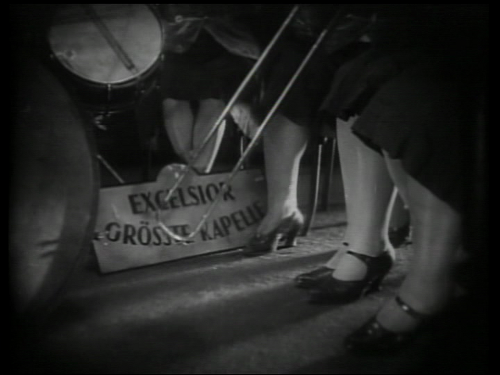 |
| If you were hoping for Dietrich's gams, you'll have to settle for these. |
Meanwhile, Vela realizes that four of his mariners are missing and orders that someone retrieve them from a joint called the Excelsior. Cut to cankles and a brass band at this bar, where the seafaring slackers are dancing drunken jigs, chasing skirts, and starting brawls. Their disloyalty to Captain Vela and their lust for a reliable ship wench augur events to come. An American doctor named William Cheyne (Robin Irvine) kindly tends to one of the injured sea dogs, but Vela doesn’t reciprocate this good Samaritan’s act, refusing to help William return to shore.
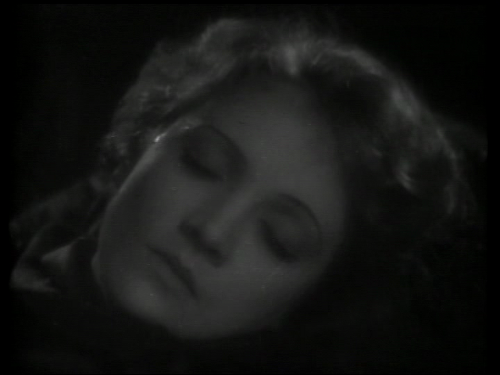 |
| How about that? Sternberg can't take all the credit for Dietrich's face! |
Making salt water taffy out of salt water, William befriends the Russian cook Grischa (Vladimir Sokoloff). While enjoying a smoke in each other’s company, they notice a sinking airplane. So noble of spirit, William dives into the ocean to save its trapped pilot, whom they discover is a woman, a fact they must keep secret.
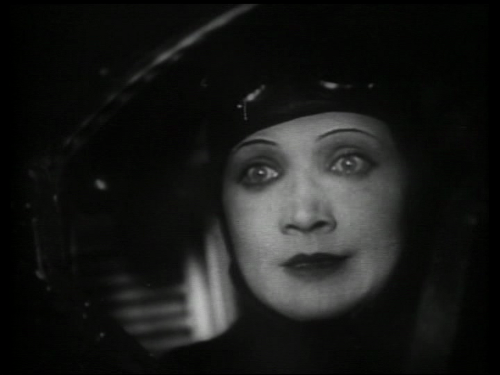 |
| On second thought, maybe I'm underestimating Jo. |
A flashback elucidates the aviatrix’s identity and the events that led up to her plunge. She’s an American socialite named
Ethel Marley (Marlene Dietrich) who was partaking in a transatlantic flight until her fuel ran out. Silly Ethel underestimated her pit stop to the Canary Islands, I imagine!
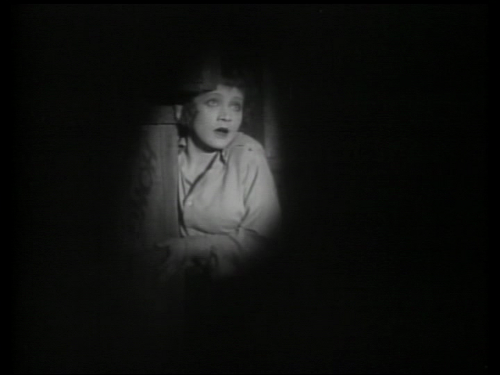 |
| Ethel, you better run to base before they tag(-team) you "it"! |
Colluding with his fellow mutineers, Morain has Vela’s monkey offed and has Vela thrown to the sharks. Then, he assumes the role of captain and reroutes the ship to Spain, where he and his henchmen will split the lucrative onboard goods. While the crew loots the ship, they discover Ethel and lecherously pursue her. Once again, William comes to her rescue, and the two kiss for the first time. Morain, however, contends with William for Ethel’s love.
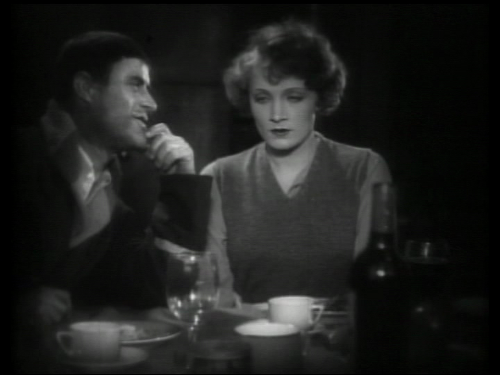 |
| Morain and Ethel. One looks lovesick, and the other--seasick! |
An abrupt cabaret scene inside the cruise ship L’Amorique transpires in juxtaposition with the horrors of Galathee, where the besotten seamen bypass Grischa to raid the wine cellar and where Morain attempts to bash in William’s skull. Clever William has anticipated the attack and shoots Morain in the arm, rousing Ethel’s attention and winning a kiss from her. The two flee Morain, but it’s the inebriated men they must fear, whose collective libido has now reached a rapacious peak.
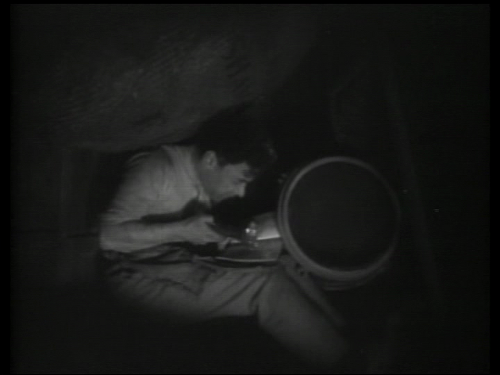 |
| I can imagine Shanghai Lily asking Grischa, "What kind of a hole did you say?" |
Defecting from Morain, Grischa finds a discreet porthole through which he sends S.O.S. signals about Ethel’s predicament, which catch the attention of L’Amorique’s captain. When the cruise ship steers toward Galathee, everyone aboard quickly takes notice and ascends to the deck to witness the ruckus.
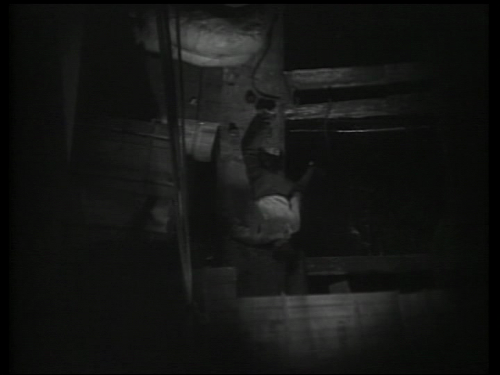 |
| Oops. |
Help can’t come soon enough when Ethel haplessly traps herself in a room with an injured but angry Morain, who attacks her until L’Amorique’s captain distracts him. Then, Morain pushes through his crew, refusing to relinquish Ethel even though his lost men aren’t quite on the same page, with one even waving a makeshift white flag. Of course, no one heeds a soon-to-be dead man’s orders, especially after a good crew member knocks Morain into Galathee’s deep hull.
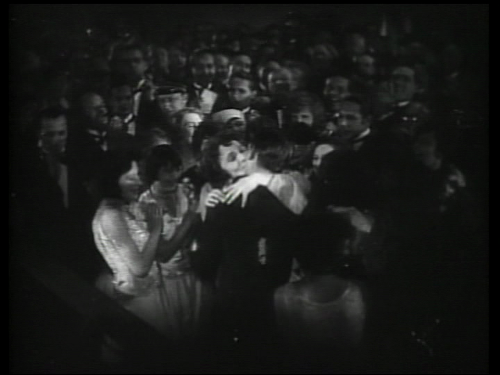 |
| There's a kitschy kissing scene for you milksops reading this. |
Thus, William and Ethel reintegrate with much fanfare among their kind of people, exchanging a happily-ever-after smooch while the riffraff get arrested. In case you were wondering about Grischa, gracious William ensures that the little Russian suffers no punishment and invites him to remain their cook.
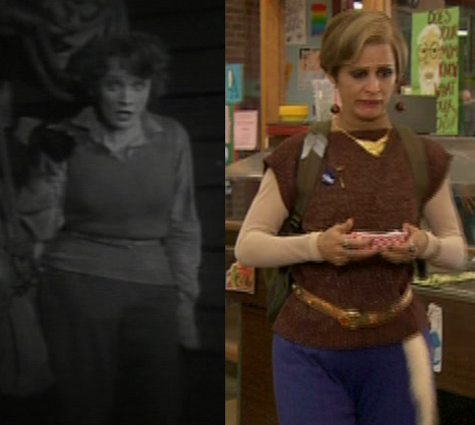 |
| Ethel Marley & Jerri Blank--separated at birth? |
Because I can't keep my big mouth shut, I'll tell you what I think about
The Ship of Lost Men. Evidently, it's a stylistic exercise for director
Maurice Tourneur, art director(s)
Franz Schroedter and (apparently)
Fritz Maurischat, and cinematographer
Nicolas Farkas, all of whom captivate me with their collective mastery over chiaroscuro. Some of the attractive embellishments include the fade-in from a black screen to the Galathee's gradually lit deck and also several shots of silhouetted crew members. More integral to the plot are Vela's fight to escape his crew's dark clutches for the deck's light, Ethel's flashing memories of her frightening crash into the murky ocean, and the crew's flashlight leering of Ethel in her stygian hiding spot.
In this bon ton role, Dietrich flaunts an extensive inventory of gestures that we rarely witness in her later movies--especially eye popping, convulsing, screaming, and galloping. Dietrich's beauty, however, does not consistently shine in this flick, and her seemingly borrowed men's wardrobe resembles
Strangers with Candy character
Jerri Blank more than
Morocco's
Amy Jolly.
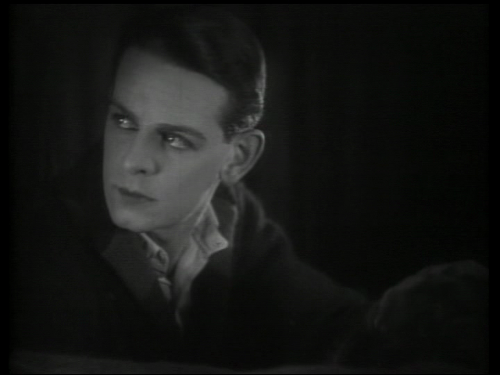 |
| William--the prettiest piece in the picture. |
Beyond fashion,
The Ship of Lost Men supports conventional class stratification--in stark contrast to Dietrich's many anti-bourgeois Hollywood movies. The criminal Morain almost never shows anything but sadism, and the rabble who follow him possess as much if not less self-control than Vela's pet monkey, neither able to quench their alcoholic thirst nor stanch their hormonal urges to rape Ethel. Speaking of Vela, nothing about the crook makes me pity him when he's ousted. On the other hand, Ethel the heiress and William the doctor exude sappy virtue, and Grischa the cook remains loyal to our upper crust heroes as only a dopey servant would. Easily, the Excelsior set could have served as
Lola-Lola's stage in
The Blue Angel--Dietrich's first talkie, made not long after
The Ship of Lost Men--but our Ethel would have never set foot in such a dump unless she accidentally crashed into it. Hence, this may be one of my least favorite Dietrich roles, but it works perfectly without spoken dialogue, just as the celluloid gods had intended
The Garden of Allah.













Thanks for the tip on where to find this DVD.
ReplyDeleteYou're welcome! There's another DVD that appears to have been released before the Grapevine one, but I never got it.
DeleteI have to get it to see the differences in MD before and after 'The Blue Angel'. Poor MD first Kortner then Jannings...
ReplyDeletethey really were hams.
Luckily, Dietrich doesn't have to share any scenes with Kortner. She mostly interacts with Robin Irvine and Gaston Modot, both of whom were far more attractive than several of Marlene's leading men.
DeleteOh dear,that first picture would win her the gurning competition.Paul
ReplyDeleteHaha! I think she was begging to have her wisdom teeth yanked out so she'd photograph better.
DeleteFrom viewing some of the stills, one can understand why Marlene preferred to sweep her silent-era career under the rug.
ReplyDeleteFor sure! Marlene's charm as an actress is apparent in The Ship of Lost Men, but her gestures make the Weimar Republic's budget look economical.
DeleteI enjoy reading about her silent films, seeing stills and reviews, as in my country it's really hard to buy those movies... You really made me laugh with "On second thought, maybe I'm underestimating Jo."... That's SO true! :D
ReplyDeleteI was hoping I'd elicit laughter! Perhaps you could email Grapevine Video to see whether they'd ship overseas and for how much. Another question you might ask is whether the DVD will play for every region (I see no indication of region on my DVD or its packaging). If anyone outside the United States has asked these questions, please share any answers you've received. I hate discussing anything that many of you may not be able to access.
DeleteI just stumbled across "Das Schiff der verlorenen Menschen" on youtube. The link for anyone who might be interested: https://www.youtube.com/watch?v=PXz6fx5c97I
ReplyDelete